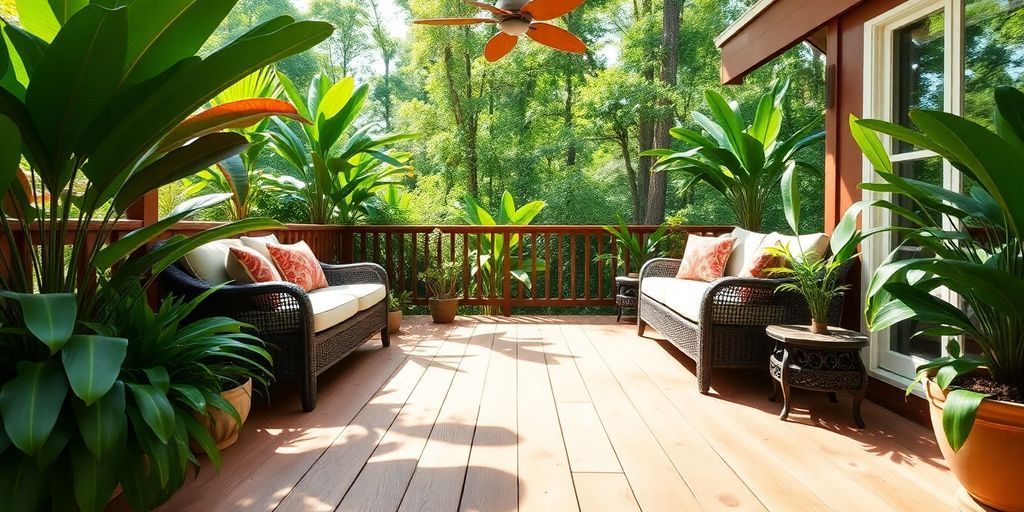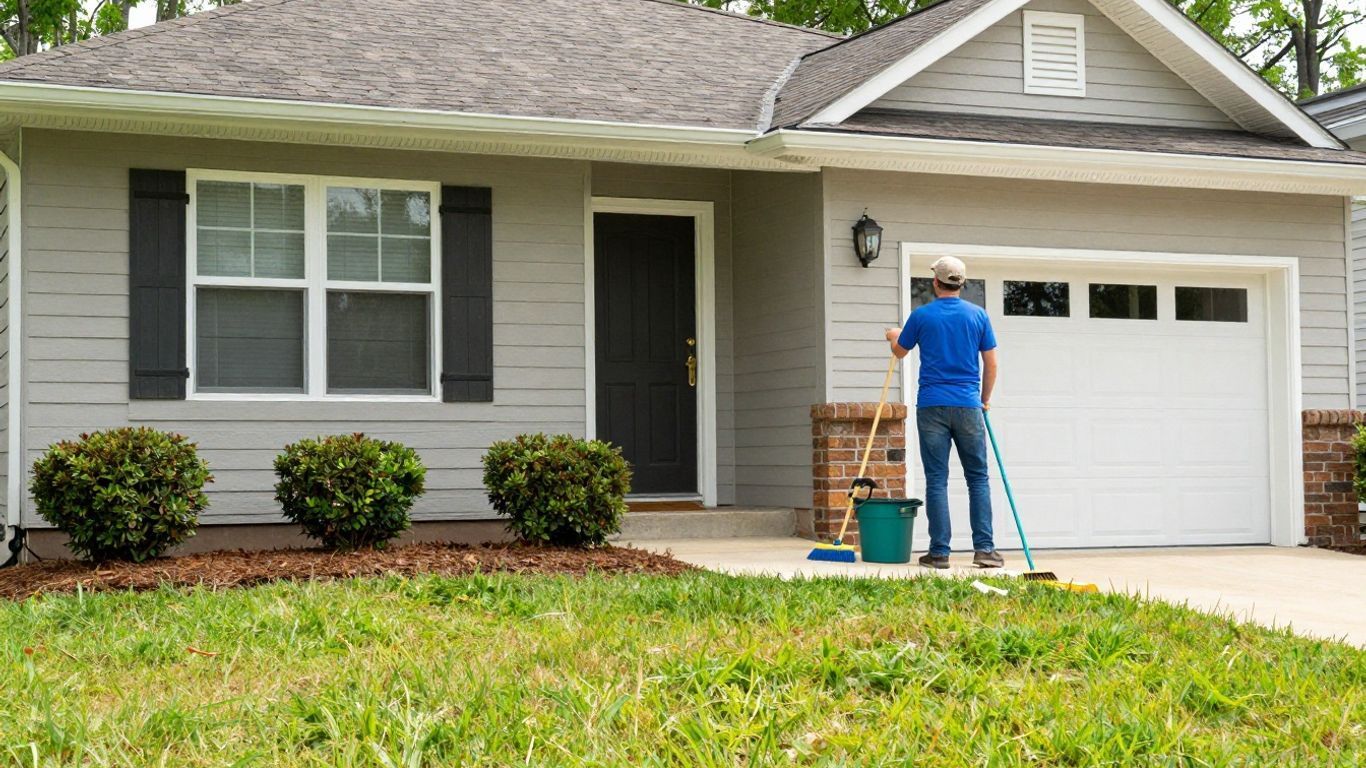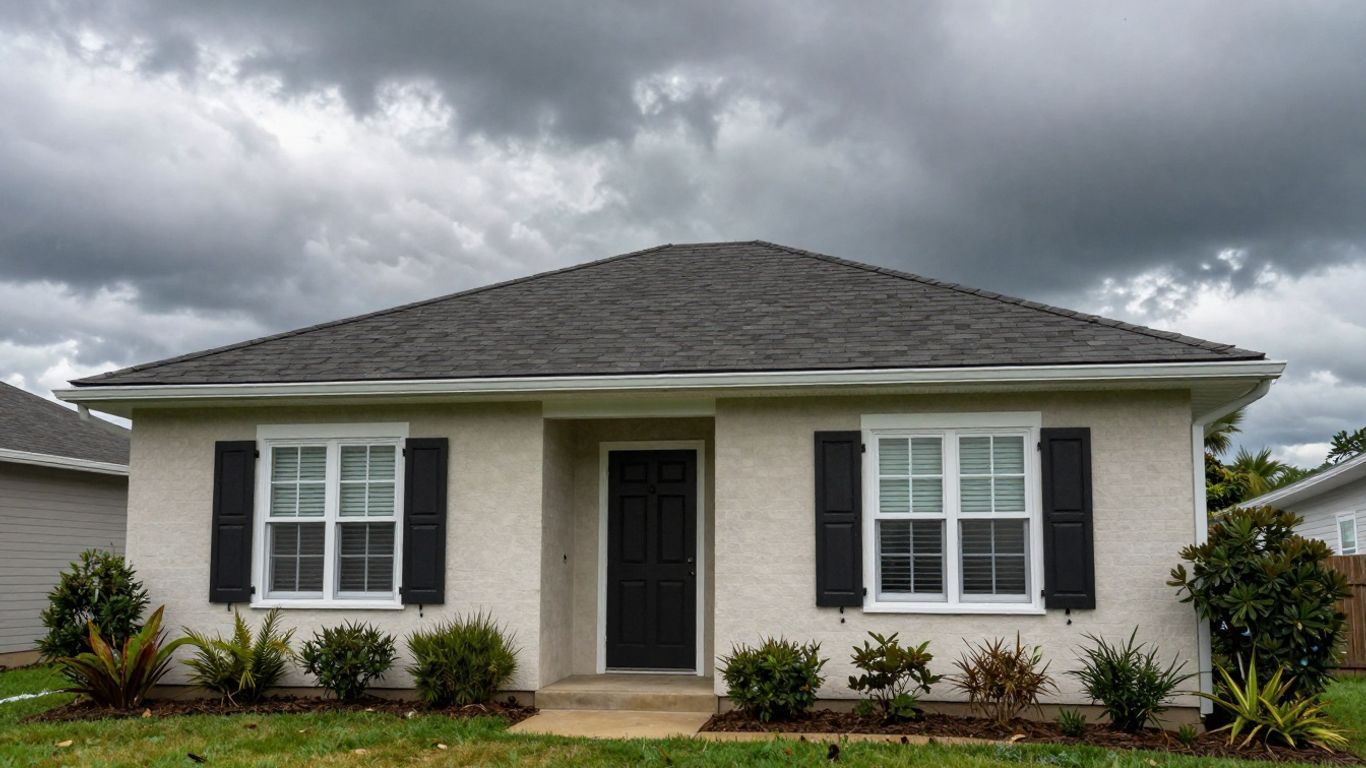Best Decking Material for Humid Summers in Northwest GA: From Ft. Oglethorpe to Rock Springs
This is a subtitle for your new post

If you live in Northwest Georgia, you know how hot and humid those summers can get. Choosing the right decking material for your outdoor space is super important, especially when you want it to last. With so many options out there, it can be tough to figure out what will hold up best against all that heat and moisture. In this article, we’ll break down the best decking for humid climate GA, helping you make a smart choice for your home.
Key Takeaways
- Humidity can damage certain decking materials, so choose wisely.
- Composite decking is popular for its durability and low maintenance.
- Pressure-treated wood is a classic option, but it needs regular upkeep.
- PVC decking offers a no-fuss solution that resists moisture and mold.
- Always check local building codes before starting your deck project.
Choosing The Right Decking Material For Humid Climates
Understanding Humidity's Impact on Decking
Humidity can really mess with your deck. It's not just about the rain; it's the constant moisture in the air that gets into everything. Wood can warp, rot, and become a breeding ground for mold. Composite materials aren't immune either; some can still develop mold or mildew, and the constant expansion and contraction can cause issues over time. Basically, you need something that can handle being damp all the time without falling apart.
Key Characteristics of Durable Decking
When you're picking out decking for a humid area, there are a few things you really need to look for:
- Moisture Resistance: This is the big one. The material should not absorb water easily.
- Mold and Mildew Resistance: Look for materials treated to prevent fungal growth.
- Dimensional Stability: You want something that won't warp, crack, or twist with changes in humidity.
Think about it this way: your deck is going to be constantly exposed to moisture. You need a material that can stand up to that without becoming a maintenance nightmare.
Comparing Natural vs. Composite Materials
Natural wood and composite decking both have their pros and cons when it comes to humidity. Natural wood, like pressure-treated lumber, can be relatively inexpensive upfront, but it requires regular sealing and staining to protect it from moisture. Without that, it's prone to rot and insect damage. Composite decking, on the other hand, is designed to be more resistant to moisture and requires less maintenance. However, it can be more expensive initially. Plus, not all composites are created equal; some are more resistant to mold and mildew than others. It really comes down to balancing cost, maintenance, and durability.
Top Decking Options For Northwest Georgia
Composite Decking: Pros and Cons
Composite decking is super popular these days, and for good reason. It's made from a mix of wood fibers and plastic, which means it's pretty tough and can handle the Northwest Georgia weather without too much fuss. One of the biggest advantages is that it doesn't rot or splinter like real wood can.
Here's a quick rundown:
- Pros: Low maintenance, resists rot and insects, comes in lots of colors and styles.
- Cons: Can be more expensive upfront, might get hot in direct sunlight, not exactly like real wood.
Pressure-Treated Wood: A Traditional Choice
Pressure-treated wood has been around forever, and it's still a solid option for decking. The wood is chemically treated to resist rot, insects, and fungal decay, which is a big deal in our humid summers. It's generally more affordable than composite decking, but it does require more upkeep.
- Pros: Affordable, readily available, can be stained or painted.
- Cons: Needs regular sealing and staining, can warp or crack over time, not as eco-friendly as some alternatives.
PVC Decking: The Low-Maintenance Alternative
PVC decking is made entirely of plastic, so it's completely waterproof and super low-maintenance. It's a bit pricier than pressure-treated wood, but it's a great choice if you don't want to spend a lot of time on upkeep. It's also resistant to stains and scratches, which is a plus if you have kids or pets.
- Pros: Waterproof, very low maintenance, resists stains and scratches.
- Cons: Can be expensive, might not look as natural as wood or composite, can get hot in direct sunlight.
Choosing the right decking material really depends on your budget, how much time you want to spend on maintenance, and the look you're going for. Each option has its own set of pros and cons, so it's worth doing your research and maybe even getting some samples to see what you like best.
Maintenance Tips For Humid Summer Conditions
Regular Cleaning Routines
Okay, so you've got your deck. Now you need to keep it clean, especially during those humid Northwest Georgia summers. Think of it like this: your deck is constantly battling moisture, dirt, and all sorts of organic stuff that can lead to problems. Regular cleaning is your first line of defense.
Here's what I try to do:
- Sweep the deck at least once a week to get rid of leaves, dirt, and debris. A good push broom works wonders.
- Wash the deck every few months with a mild soap and water solution. Don't go crazy with harsh chemicals; they can damage the finish.
- Pay special attention to areas that tend to collect moisture, like corners and under furniture. These are breeding grounds for mold and mildew.
Sealing and Staining Recommendations
Sealing and staining are super important for protecting your deck from the elements. Sealer helps to keep water out, while stain adds color and provides an extra layer of protection against UV rays and moisture.
Here's the deal:
- Check your deck's finish regularly. If water starts to soak into the wood instead of beading up, it's time to reseal or restain.
- Choose a high-quality sealer or stain that's designed for outdoor use and specifically formulated for your type of decking material. Read the labels carefully!
- Apply the sealer or stain on a dry day, and make sure the deck is clean and dry before you start. Follow the manufacturer's instructions to a T.
Identifying and Preventing Mold Growth
Mold. Ugh. It's the bane of every deck owner's existence, especially in humid climates. Mold not only looks gross, but it can also damage your deck and even pose health risks.
The key to preventing mold is to keep your deck clean and dry. Make sure there's good airflow around the deck, and trim back any vegetation that's blocking sunlight or trapping moisture. If you spot mold, tackle it right away with a mold cleaner or a solution of bleach and water. Always wear gloves and eye protection when dealing with mold, and be sure to rinse the area thoroughly afterward.
Here are some tips:
- Look for dark spots or discoloration on the deck surface. Mold often appears as black, green, or brown patches.
- Check for a musty odor, especially in damp areas.
- Clean moldy areas with a deck cleaner containing mildewcide. Follow the product instructions carefully.
Cost Considerations For Decking Materials
Budgeting For Initial Installation
Okay, so you're dreaming of a new deck. Awesome! But let's talk money. The upfront cost is a biggie. You've got the material itself, obviously. But don't forget the frame underneath – that lumber adds up! Then there's labor. Unless you're super handy (and have the time!), you'll need to pay someone to build it. Permits are another potential expense; check your local rules. Factor in things like screws, nails, flashing, and maybe even renting tools. It's easy to underestimate, so get a few quotes and pad your budget a bit. You don't want any surprises halfway through the project.
Long-Term Maintenance Costs
It's not just about the initial price tag. Think long-term. Some materials need more love than others. Wood decks, for example, will need staining or sealing every few years. That's both time and money. Composite decking is often advertised as low-maintenance, but it's not no-maintenance. You'll still need to clean it regularly. And even composite can fade or stain over time. Consider the cost of cleaners, sealants, and any potential repairs down the road. A little bit of preventative care can save you a lot of money later on.
Value Retention Over Time
Will your deck add value to your home? Probably! But how much value depends on a few things. The quality of the materials matters. A well-built deck using durable materials will hold its value better than a cheap, flimsy one. The style of the deck should also complement your house. A modern composite deck might look out of place on a Victorian home. And, of course, maintenance is key. A neglected deck will quickly become an eyesore and detract from your home's value. Keep it clean, make repairs promptly, and your deck should be a worthwhile investment.
Think of your deck as an investment, not just an expense. Choosing the right materials and maintaining it properly will pay off in the long run, both in terms of enjoyment and resale value.
Environmental Factors Affecting Deck Longevity
Sun Exposure and UV Damage
Okay, so the sun. We all love it, right? But your deck? Not so much. The sun's UV rays are brutal. They can fade the color of your deck, making it look old and tired way before its time. Think of it like leaving a plastic toy outside for years – it gets brittle and cracks. Plus, UV damage can weaken the structural integrity of some decking materials, especially certain types of plastic-based composites. It's not just about looks; it's about how long your deck will actually last.
Rainfall and Moisture Retention
Rain, rain, go away... unless you're a plant. For decks, constant moisture is a major enemy. Wood decks can rot, warp, and swell. Composite decks, while more resistant, can still suffer from mold and mildew growth if water sits on them for too long. Proper drainage is key. Make sure water can run off easily and doesn't pool anywhere.
Here's what you should consider:
- Ensure proper spacing between deck boards.
- Check for any areas where water tends to accumulate.
- Clean debris regularly to prevent moisture buildup.
Temperature Fluctuations
Northwest Georgia weather can be a rollercoaster. Hot summers, cold winters, and everything in between. These temperature swings can cause decking materials to expand and contract. Over time, this constant movement can lead to cracks, loose screws, and an overall weakening of the deck's structure. Think about how roads buckle in extreme heat or cold. The same thing happens, just on a smaller scale, with your deck. Choosing a material that can handle these fluctuations is super important. For example, you might want to consider the lifespan of wooden decking when making your decision.
Dealing with temperature changes is a constant battle. Selecting materials designed to withstand expansion and contraction is a smart move. Regular inspections can also help catch problems early before they become major headaches.
Local Regulations and Building Codes
Building a deck isn't just about picking the right materials and design; you also have to make sure you're following all the local rules. It can be a bit of a headache, but getting it right from the start saves you a lot of trouble down the road. Trust me, dealing with fines or having to redo work is not fun.
Understanding Local Decking Regulations
Every city and county has its own set of rules about what you can build and how you can build it. These regulations cover things like how far your deck needs to be from property lines, how big it can be, and what kind of support it needs. It's not a one-size-fits-all situation, so what's okay in Ft. Oglethorpe might not fly in Rock Springs.
- Zoning laws dictate where you can build.
- Setback requirements define the distance from property lines.
- Height restrictions limit how high your deck can be.
Permits Required for Deck Construction
Before you even think about buying lumber, you'll probably need to get a permit. Permits are basically permission slips from the local government that say you're allowed to build your deck. They make sure your plans meet safety standards and building codes. Applying for a permit usually involves submitting detailed plans of your deck, including dimensions, materials, and construction methods.
Getting a permit might seem like a pain, but it's there to protect you and your neighbors. It ensures your deck is safe and won't cause any problems down the line.
Safety Standards for Decking in GA
Georgia has specific safety standards for decks to prevent accidents and injuries. These standards cover everything from the strength of the materials to the spacing of the railings. You'll need to make sure your deck meets these requirements to pass inspection.
- Railings must be a certain height to prevent falls.
- Stairways need to have proper rise and run dimensions.
- The deck must be able to support a certain weight load.
Expert Recommendations For Decking Choices
Consulting Local Contractors
Getting advice from people who build decks in Ft. Oglethorpe, Rock Springs, and everywhere in between is super smart. They know what works and what doesn't in our specific climate. Local contractors can provide insights into the best materials and construction techniques for dealing with Northwest Georgia's humid summers.
- Ask about their experience with different decking materials.
- Get references and check out their previous work.
- Discuss your specific needs and budget.
Reading Customer Reviews
Customer reviews can be a goldmine of information. You can learn a lot about the real-world performance of different decking materials and the quality of work from various contractors. Look for patterns in the reviews – are people consistently praising a certain brand or complaining about a particular contractor?
- Check reviews on multiple platforms (Google, Yelp, etc.).
- Pay attention to reviews that mention durability and maintenance.
- Consider both positive and negative feedback to get a balanced view.
Evaluating Warranty Options
A good warranty can save you a lot of headaches down the road. Make sure you understand what the warranty covers and how long it lasts. Some warranties only cover manufacturing defects, while others also cover things like fading or staining. It's worth spending a little extra for a more comprehensive warranty.
- Read the fine print carefully.
- Compare warranties from different manufacturers.
- Keep your warranty documentation in a safe place.
Choosing the right decking material is a big decision, and it's easy to feel overwhelmed by all the options. Don't be afraid to ask questions and do your research. A little bit of effort upfront can save you a lot of time and money in the long run. For example, PVC decking is a great option for damp climates.
When choosing the right decking for your home, it's important to listen to the experts. They suggest looking for materials that are durable and easy to maintain. Whether you prefer wood or composite, make sure it fits your style and budget. For more tips and detailed advice, visit our website today!
Wrapping It Up
So, when it comes to picking the best decking material for those hot, sticky summers in Northwest Georgia, you’ve got options. Whether you lean towards wood, composite, or even PVC, each has its ups and downs. Just remember, the right choice will depend on your budget, how much maintenance you’re willing to do, and how you plan to use your deck. Take your time, do a little research, and think about what fits your lifestyle best. After all, you want a space that’s not just nice to look at, but also comfy and durable for all those summer BBQs and family hangouts.
Frequently Asked Questions
What is the best decking material for humid weather?
The best decking materials for humid weather include composite decking and PVC, as they resist moisture and do not warp easily.
How does humidity affect wooden decks?
Humidity can cause wooden decks to swell, warp, and develop mold, which can lead to damage over time.
What are the maintenance tips for decks in humid climates?
Regular cleaning, sealing, and checking for mold are important to keep your deck in good shape during humid summers.
Is composite decking worth the cost?
Yes, composite decking can be worth the cost because it lasts longer and requires less maintenance than wood.
What should I consider when choosing decking materials?
You should think about durability, maintenance needs, cost, and how well the material handles humidity.
Do I need a permit to build a deck in Northwest Georgia?
Yes, you usually need a permit for building a deck, so it's important to check local building codes before starting.


